Перевод статьи. Удк 65. 011. 56 Применение систем искусственного интеллекта в управлении предприятием
 Скачать 183.13 Kb. Скачать 183.13 Kb.
|
|
УДК 65.011.56 ПРИМЕНЕНИЕ СИСТЕМ ИСКУССТВЕННОГО ИНТЕЛЛЕКТА В УПРАВЛЕНИИ ПРЕДПРИЯТИЕМ Вербицкая В.В., Соколова Я.А. Южно-Российский институт управления РАНХиГС, Ростов-на-Дону В данной статье дается анализ применения систем искусственного интеллекта в различных областях управления предприятием. Рассмотрены положительные стороны, а также проблемы внедрения искусственного интеллекта на российском рынке. Приведены перспективы развития данного направления в ближайшие 5 лет с учетом возрастающей роли автоматизированного производства и организации работы предприятием в его развитии и повышении конкурентоспособности. Ключевые слова: искусственный интеллект, электронный документооборот, управление предприятием, автоматизация, технологии. APPLICATION OF ARTIFICIAL INTELLIGENCE SYSTEMS IN ENTERPRISE MANAGEMENT Verbitskaya V.V, Sokolova Y.A. South Russian institute of management RANEPA, Rostov-on-Don This article analyzes the application of artificial intelligence systems in various areas of enterprise management. The positive aspects, as well as the problems of implementing artificial intelligence in the Russian market, are considered. The prospects for the development of this direction in the next 5 years are given, taking into account the increasing role of automated production and organization of work by the enterprise in its development and increasing competitiveness. Keywords: artificial intelligence, electronic document management, enterprise management, automation, technologies. Искусственный интеллект становится важнейшим элементом управления во многих организациях, в полной мере изменяя функции и механизмы управленческой деятельности, систему принятия решений, взаимоотношения и коммуникацию на предприятии. Поэтому вопрос о внедрении систем искусственного интеллекта в управление является особо актуальным в наше время. Приоритетные направления использования и развития ИИ-технологий определяются на основе национальных целей и стратегических задач, определенных Указом Президента Российской Федерации от 7 мая 2018 г. № 204 «О национальных целях и стратегических задачах развития Российской Федерации на период до 2024 года». Также, Указом Президента РФ от 10 октября 2019 г. № 490 "О развитии искусственного интеллекта в Российской Федерации” определяется, что использование технологий искусственного интеллекта в экономике повышает эффективность процессов планирования, прогнозирования и принятия управленческих решений. Сегодня, в эпоху цифровой экономики, многие компании трансформируются, растут, выходят на новые рынки. Для того, чтобы темпы развития бизнеса оставались на высоком уровне, необходим гибкий и современный подход к управлению. Следовательно, внедрение новых технологий в службу управления приобретает свою актуальность. По данным аналитиков IDC, российские компании инвестировали $172,5 млн в развитие технологий искусственного интеллекта в 2019 году (рис 1). 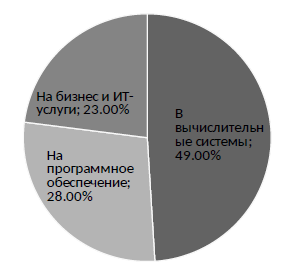 Рис.1. Инвестиции на создание решений с применением ИИ Больше всех в искусственный интеллект вкладывает финансовый сектор экономики: 41% инвестиций в 2019 году пришлось на них. За ним расположились такие отрасли, как производство (16%), оптовая и розничная торговля (14%), государственный сектор (6%) и остальные рынки (23%). Искусственный интеллект — это способность цифрового компьютера или робота, управляемого компьютером, осуществлять задачи, обычно выполняемые разумными существами. Появлению таких технологий способствовало активное развитие данной сферы, а также, серьезные достижения в науке. Системы искусственного интеллекта находят свое применение в разных аспектах управления предприятием, начиная от управления персоналом, заканчивая полной обработкой документов. Рассмотрим принципы работ таких систем на конкретных примерах. Такие лидеры программного обеспечения, как SAP, Microsoft, Veriato, IBM, Entelo, BluVision разрабатывают системы искусственного интеллекта, которые помогают оптимизировать управленческие вопросы предприятия. Одним из лидеров «цифровизации» управления персоналом является SAP. Для упрощения данных процессов и повышения продуктивности производитель программного обеспечения предлагает ряд решений для компаний, а именно: программы по обучению и повышению квалификации; адаптация и подбор рабочего персонала; процессы планирования и анализа и т.д. Программное обеспечение, которое предлагается компанией-разработчиком, способно на треть сократить текучесть кадров. Благодаря возможности моделирования состава и затрат труда, становится реальностью способность оценить финансовые последствия деятельности сотрудников. В данном случае, бумажная отчетность сокращается на 72%, а доход компаний увеличивается примерно на 20%. Помимо программных обеспечений, действующих автономно, существуют целые организации, способные координировать управленческую деятельность любого предприятия, возлагая на себя все обязанности по внедрению ИИ-систем. Рассмотрим это на примере российской фирмы. Gridnine Systems – компания, помогающая автоматизировать внутренние процессы и взаимодействие с клиентами с помощью решений на основе искусственного интеллекта. У GS есть опыт разработки и введения в промышленную эксплуатацию систем, использующих технологии искусственного интеллекта: 1) Интеллектуальная динамическая система «Ассистент менеджера по продажам» - анализируя большой объём исторических и оперативных данных, выдаёт различные рекомендации, в том числе касающиеся ценообразования. 2) Система планирования закупок для большой разветвлённой сети региональных складов — учитывает множество факторов и строит прогноз спроса для предсказания остатков на складах. 3) Отчетно-аналитические системы — сбор, анализ и визуализация данных для поддержки принятия управленческих решений. 4) Гибкая онлайн-система формирования рекомендаций по товарам и услугам в интернет-магазине — учитывает множество маркетинговых и коммерческих правил, а также индивидуальную и обобщенную статистику продаж. Технологии ИИ применяются в системе электронного документооборота (СЭД), исключающего человеческий фактор при выполнении рутинных задач. Искусственный интеллект полностью автоматизирует процесс обработки документов: распознавание документов, их классификация, забор данных документа, занесение их в карточку регистрации, отправление документа на его рассмотрение, ввод и сбор информации о новом контрагенте и тд. Существует несколько этапов работы ИИ-технологии в системе электронного документооборота: 1-й этап – ввод документа в систему с оператора обмена электронными документами, e-mail , потокового сканера; 2-й этап – процесс распознавания искусственным интеллектом текста и его извлечение. В итоге формируется PDF-документ с распознанным текстом; 3-й этап – классификация документов в системе проводится с помощью разноформатных ИИ-алгоритмов: 1) по виду документа (счет-фактура, договор, письмо), 2)по месту регистрации, по категории, журналу, по источнику происхождения; 4-й этап – процесс извлечение документа. Использование систем искусственного интеллекта в скором времени может вовсе заменить человека, его навыки в управлении и ведении переговоров. Ученые из Массачусетского технологического института разработали систему искусственного интеллекта, способную поддерживать отношения и вести переговоры эффективнее людей. С помощью специального алгоритма исследователи запрограммировали машины, а затем протестировали их в разных ситуациях взаимодействия. В большинстве испытаний система превосходила людей в поиске компромиссов, приносящих пользу обеим сторонам. Положительные полученные результаты могут иметь долгосрочную перспективу для человеческих отношений. Что же касается российского опыта использования ИИ-технологий, особыми успехами может похвастаться страховая компания «СОГАЗ», которая внедрила технологическое решение, позволяющее более точно прогнозировать объем получения медицинской помощи новыми корпоративными клиентами по ДМС и соответствующие выплаты лечебным учреждениям. В этой технологии используются предиктивные модели, которые прогнозируют поведение застрахованных на основании более чем 70 признаков. С их помощью андеррайтеры СОГАЗа могут в течение нескольких минут рассчитывать то, с какойчастотой, в каких клиниках и в каком объеме застрахованные будут получать медицинскую помощь. Данные цифровые технологии позволило добиться совокупного экономического эффекта почти в 1 млрд. руб. в 2019 году. В процессе анализа областей применения систем искусственного интеллекта на предприятиях, можно выделить следующие положительные стороны управления на базе данных технологий: 1) способность масштабирования бизнеса без перегоняющего роста издержек. Автоматическая обработка запросов и подбор предложений при резком увеличении количества клиентов не увеличит транзакционные затраты; 2) кастомизация товаров и услуг в условиях обслуживания огромного количества клиентов. Умная система управления индивидуализирует продукт автоматически на основе предыдущих заказов и просмотров каталога клиентом; 3) обеспечение объективности принятия управленческих решений посредством их автоматизации, что приводит к сокращению ошибок решений, принятых субъективными лицами; 4) мониторинг состояния рынка. Технологии умного управления способны отслеживать изменения и оценивать динамику всех рыночных процессов (появление нового продукта, изменение потребительских предпочтений и тд). 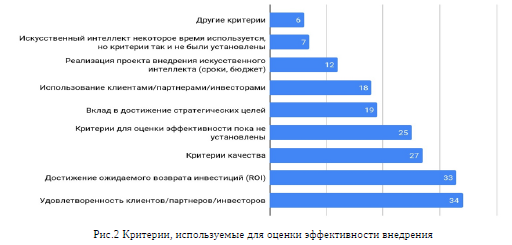 искусственного интеллекта в работу предприятия (рис.2), следует отметить, что компании на пути цифровизации своей деятельности встречаются с рядом проблем. Сдерживающим фактором внедрения и использования основанных на ИИ-алгоритмах технологий является отсутствие цифрового понимания, мышления и знаний у многих работников и управленческого аппарата, дефицит инвестиций, специалистов в ИКТ сфере и размеры компании, которые определяют объемы проводимых операций. Согласно исследованию Проектного офиса по реализации национальной программы «Цифровая экономика» Всероссийского центра изучения общественного мнения (ВЦИОМ) и Аналитического центра при Правительстве России около 43% российского бизнеса не обращается к искусственному интеллекту в работе и не планирует использовать его в будущем. Существуют различные причины выявленных результатов исследования. Около 37% респондентов заявили, что у них нет необходимости в подобных технологиях, 28% сказали, что сфера их деятельности не подразумевается использование ИИ. Примерно 11% признались, что причина отсутствия соответствующих технологий – это недостаток достаточных знаний о них, а 8% заявили, что их смущает достаточно высокая стоимость их внедрения. Еще 6% отказываются от использования потому, что у них маленькая компания, а 4% потому, что в России слабо развиты подобные технологии. Около 4% просто не доверяют современным технологиям и предпочитают человеческий труд. Так, можно выделить три основные причины отказа бизнеса от использования технологий искусственного интеллекта. Первая — это отсутствие таких наглядных кейсов, которые доказывали бы эффективность данных технологий. Вторая — отсутствие доступных решений и массовых продуктов в данной сфере. Третья причина — нехватка компетенций на рынке. 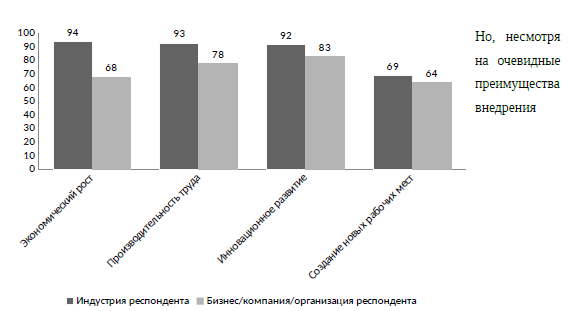 Рис. 3. Ожидаемое влияние развития технологий ИИ в течение 5 лет (2019-2024), % Таким образом, проведя исследование опыта внедрения искусственного интеллекта на предприятиях, рассмотрев его возможности, стоит утверждать, что у искусственного интеллекта в сфере управления имеются как сложности, так и большие перспективы развития. Современные программные решения создают хорошие возможности для роста и совершенствования компаний. Использование новых технологий для оптимизации процессов управления в компаниях оправдано (рис.3). Кроме того, что искусственный интеллект облегчает процесс работы, осуществляя задачи на основе заложенных алгоритмов, он способствует более эффективному использованию времени сотрудников, которое может быть направлено на решение глобальных вопросов, с которыми справится только человек. Список литературы: Нормативно-правовые документы Указ Президента РФ от 10 октября 2019 г. № 490 "О развитии искусственного интеллекта в Российской Федерации”// [Электронный ресурс]. URL: https://www.garant.ru/products/ipo/prime/doc/72738946/ Статьи из электронных журналов Искусственный интеллект (рынок России)// [Электронный ресурс]. URL: https://www.tadviser.ru/index.php/ Статья : Искусственный интеллект ( рынок России )? source=post_page--------------------------- Петров А.А., «Человек, искусственный интеллект и управление»// [Электронный ресурс]. URL: https://cyberleninka.ru/article/n/chelovek-iskusstvennyy-intellekt-i-upravlenie Интернет-сайты Официальный сайт Gridnine Systems.// [Электронный ресурс]. URL: https://gridnine.com/ Портал искусственного интеллекта.// [Электронный ресурс]. URL: http :// www . aiportal . ru / news /13566 . html APPLICATION OF ARTIFICIAL INTELLIGENCE SYSTEMS IN ENTERPRISE MANAGEMENT Verbitskaya V.V, Sokolova Y.A. South Russian institute of management RANEPA, Rostov-on-Don This article analyzes the application of artificial intelligence systems in various areas of enterprise management. The positive aspects, as well as the problems of implementing artificial intelligence in the Russian market, are considered. The prospects for the development of this direction in the next 5 years are given, taking into account the increasing role of automated production and organization of work by the enterprise in its development and increasing competitiveness. Keywords: artificial intelligence, electronic document management, enterprise management, automation, technologies. Artificial intelligence is becoming the most important element of management in many organizations, fully changing the functions and mechanisms of management activities, decision-making system, relationships and communication in the enterprise. Therefore, the issue of implementing artificial intelligence systems in management is particularly relevant at this time. Priority areas for the use and development of AI technologies are determined on the basis of national goals and strategic objectives defined by Presidential Decree No. 204 of May 7, 2018 "On National Goals and Strategic Objectives for the Development of the Russian Federation until 2024". Also, Presidential Decree No. 490 of October 10, 2019 "On the Development of Artificial Intelligence in the Russian Federation" determines that the use of artificial intelligence technologies in the economy increases the efficiency of planning, forecasting and managerial decision-making processes. Today, in the era of the digital economy, many companies are transforming, growing, and entering new markets. In order to keep the pace of business development at a high level, a flexible and modern approach to management is necessary. Consequently, the implementation of new technologies in the management service becomes relevant. According to IDC analysts, Russian companies invested $172.5 million in the development of artificial intelligence technology in 2019 (Fig. 1). 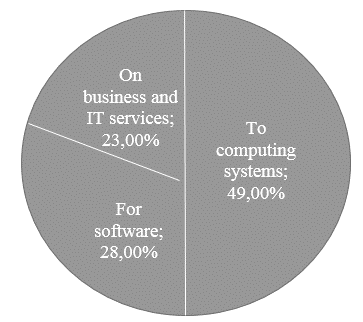 Fig. 1. Investment in the creation of AI solutions The financial sector of the economy invests the most in artificial intelligence: 41% of investments in 2019 were in them. It was followed by industries such as manufacturing (16%), wholesale and retail trade (14%), the public sector (6%), and other markets (23%). Artificial Intelligence is the ability of a digital computer or computer-controlled robot to perform tasks normally performed by intelligent beings. The emergence of such technologies has been facilitated by the active development of this field, as well as, major advances in science. Artificial intelligence systems find their application in different aspects of business management, ranging from personnel management to complete processing of documents. Let's consider the principles of work of such systems on concrete examples. Such software leaders as SAP, Microsoft, Veriato, IBM, Entelo, BluVision are developing artificial intelligence systems that help optimize the management issues of an enterprise. One of the leaders in the "digitalization" of HR management is SAP. To simplify these processes and increase productivity the software producer offers a number of solutions for companies, namely programs for training and professional development; adaptation and selection of working personnel; planning and analysis processes, etc. The software offered by the company is capable of reducing staff turnover by a third. Thanks to the ability to simulate the composition and cost of labor, the ability to assess the financial impact of staff becomes a reality. In this case, paper reporting is reduced by 72%, and companies' income increases by about 20%. In addition to software that operates autonomously, there are entire organizations capable of coordinating the management activities of any enterprise, assuming all responsibilities for the implementation of AI systems. Let us look at the example of a Russian firm. Gridnine Systems is a company that helps automate internal processes and customer interactions with the help of artificial intelligence solutions. GS has experience in developing and putting into commercial operation systems that use artificial intelligence technologies: 1) Intelligent dynamic system "Sales Manager Assistant" - Analyzing a large amount of historical and operative data, issues various recommendations, including those related to pricing. 2) Procurement planning system for a large branched network of regional warehouses - it takes into account a lot of factors and makes demand forecast for forecasting stock balances in warehouses. 3) Reporting and analytical systems - collects, analyzes and visualizes data to support management decision-making. 4) Flexible online system of recommendations for goods and services in the online store - takes into account a variety of marketing and commercial rules, as well as individual and generalized sales statistics. AI technologies are used in the electronic document management system (EDMS), which eliminates the human factor in the performance of routine tasks. Artificial intelligence fully automates the process of document processing: document recognition, classification, document data collection, entering it into the registration card, sending a document for review, entering and collecting information about a new counterparty, etc. There are several stages of AI-technology in the electronic document management system: Stage 1 - document entry into the system from an electronic document exchange operator, e-mail, streaming scanner; The 2nd stage is the process of text recognition and extraction by artificial intelligence. The result is a PDF document with the recognized text; Stage 3 - classification of documents in the system is carried out using multi-format AI algorithms: 1) by type of document (invoice, contract, letter), 2) by place of registration, category, journal, source of origin; The 4th stage is the process of document extraction. The use of artificial intelligence systems may soon replace humans altogether, their skills in management and negotiation. Scientists from the Massachusetts Institute of Technology have developed an artificial intelligence system capable of maintaining relationships and negotiating more effectively than humans. Using a special algorithm, the researchers programmed the machines and then tested them in different interaction situations. In most tests, the system outperformed humans in finding compromises that benefited both parties. The positive results obtained may have a long-term perspective on human relationships. As for the Russian experience of using AI technologies, the insurance company SOGAZ can boast particular successes, having implemented a technological solution that makes it possible to more accurately predict the amount of medical care received by new corporate clients under VHI and the corresponding payments to medical institutions. This technology uses predictive models that predict the behavior of the insured on the basis of more than 70 attributes. With their help, SOGAZ underwriters can calculate within a few minutes with what frequency, in which clinics and to what extent the insured will receive medical care. These digital technologies made it possible to achieve a cumulative economic effect of almost 1 billion rubles in 2019. During the analysis of areas of application of artificial intelligence systems in enterprises, the following positive aspects of management based on these technologies can be highlighted: 1) The ability to scale the business without distorting cost growth. Automatic processing of requests and selection of offers with a sharp increase in the number of customers will not increase transaction costs; 2) Customization of products and services when serving a huge number of customers. Smart control system individualizes the product automatically based on previous orders and catalog views by the client; 3) ensuring objectivity of management decisions through their automation, which leads to a reduction of decision errors made by subjective individuals; 4) monitoring the state of the market. Smart management technologies are able to monitor changes and evaluate the dynamics of all market processes (appearance of a new product, change in consumer preferences, etc.). But despite the obvious benefits of introducing artificial intelligence into the work of the enterprise (Fig. 2), it should be noted that companies on the way to digitalization of their activities face a number of problems. 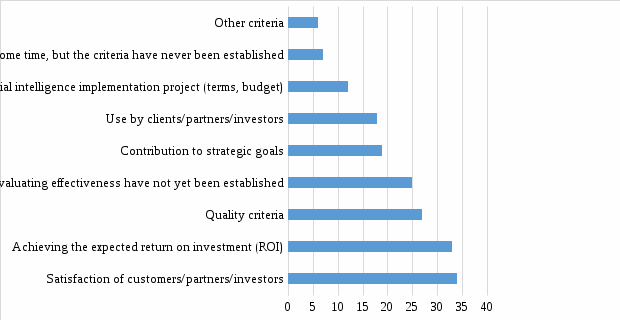 Fig. 2 Criteria used to evaluate the effectiveness of implementation The deterrent to the introduction and use of AI-based technologies is the lack of digital understanding, thinking and knowledge among many employees and management personnel, the lack of investment, ICT specialists and the size of the company that determines the volume of operations. According to the research of the Project Office for the implementation of the national program "Digital Economy" of the All-Russian Center for the Study of Public Opinion (VTsIOM) and the Analytical Center under the Government of Russia, about 43% of Russian businesses do not turn to artificial intelligence in their work and do not plan to use it in the future. There are different reasons for the revealed results of the research. About 37% of respondents said that they have no need for such technologies, 28% said that the sphere of their activity does not involve the use of AI. About 11% admitted that the reason for not using the relevant technologies is the lack of sufficient knowledge about them, and 8% said they are embarrassed by the rather high cost of their implementation. Another 6% refuse to use because they have a small company, and 4% because there is little development of such technologies in Russia. About 4% simply do not trust modern technology and prefer human labor. So, we can identify three main reasons why businesses refuse to use artificial intelligence technologies. The first is the lack of such clear cases that would prove the effectiveness of these technologies. The second reason is the lack of available solutions and mass products in this area. The third reason is the lack of competences on the market. Thus, conducting a study of the experience of implementing artificial intelligence in enterprises, having considered its possibilities, it is worth stating that artificial intelligence in the field of management has both difficulties and great prospects for development. Modern software solutions create good opportunities for growth and improvement of companies. The use of new technologies to optimize management processes in companies is justified (Fig. 3). 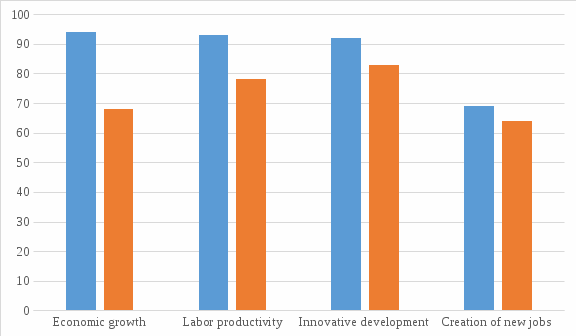 Fig. 3. Expected impact of AI technology development over 5 years (2019-2024), % In addition to the fact that artificial intelligence facilitates the work process by performing tasks based on laid down algorithms, it contributes to a more efficient use of employee time, which can be aimed at solving global issues that only humans can cope with. List of references: Regulatory documents Presidential Decree of October 10, 2019 № 490 "On the development of artificial intelligence in the Russian Federation" // [Electronic resource]. URL: https://www.garant.ru/products/ipo/prime/doc/72738946/ Articles from electronic journals Artificial Intelligence (Market of Russia) // [Electronic resource]. URL: https://www.tadviser.ru/index.php/Статья:Искусственный_интеллект_(рынок_России)?source=post_page--------------------------- Petrov A.A., "Man, Artificial Intelligence and Management"// [Electronic resource]. URL: https://cyberleninka.ru/article/n/chelovek-iskusstvennyy-intellekt-i-upravlenie Internet sites Official website of Gridnine Systems. // [Electronic resource]. URL: https://gridnine.com/ Artificial Intelligence Portal. // [Electronic resource]. URL: http://www.aiportal.ru/news/13566.html |
